Episodes
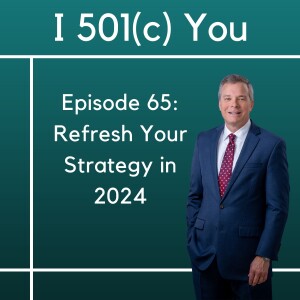
Tuesday Dec 26, 2023
Tuesday Dec 26, 2023
You do not need to create a new strategic plan every year. However, it would be of value to update your current strategic plan. We do this through a "strategy refresh". A short facilitated session in which we help you refresh your strategic plan with up-to-date information and knowledge. In an ever changing environment, your strategic direction should be influenced by the best and most recent information available.
Timestamps:
00:00 The last podcast of 2023
01:05 Strategy Refresh
Join us every week as we release a new podcast with information about how you can be the best board member and provide great service to your organization.
Listen to the podcast on any of the following platforms:
Apple Podcasts
Spotify Podcasts
Amazon
iHeartRadio
Visit us at: www.thecorleycompany.com/podcast
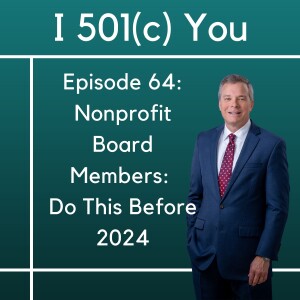
Tuesday Dec 19, 2023
Tuesday Dec 19, 2023
As the year comes to an end, there are a few tasks nonprofit board members can complete to wrap the year up successfully. These short but powerful tasks can help you get a head start on the new year and be prepared for your board responsibilities in 2024.
Timestamps:
00:00 What can you do as a board member before the end of the year?
01:20 #1 - Read your bylaws
01:50 #2 - Catch up on meeting minutes
02:40 #3 - Tell someone about your involvement with the organization
03:28 #4 - Make a donation
04:20 #5 - Send your executive director a note of appreciation
Join us every week as we release a new podcast with information about how you can be the best board member and provide great service to your organization.
Listen to the podcast on any of the following platforms:
Apple Podcasts
Spotify Podcasts
Amazon
iHeartRadio
Visit us at: www.thecorleycompany.com/podcast
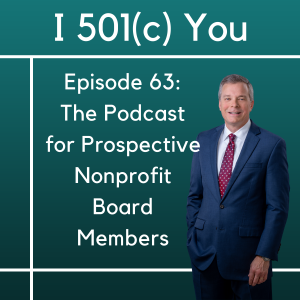
Tuesday Dec 12, 2023
Tuesday Dec 12, 2023
This week, we discuss aspects of nonprofit board membership prospective board members should consider before joining a board. Everyone on the board should be willing to give their time, talent, and treasure to their organization. Be sure to ask plenty of questions prior to joining a board to have a clear understanding of the level of commitment the organization is expecting.
Timestamps:
00:00 The Podcast for Prospective Nonprofit Board Members
01:15 Giving your time
02:08 Giving your talent
02:54 Giving your treasure
Join us every week as we release a new podcast with information about how you can be the best board member and provide great service to your organization.
Listen to the podcast on any of the following platforms:
Apple Podcasts
Spotify Podcasts
Amazon
iHeartRadio
Visit us at: www.thecorleycompany.com/podcast
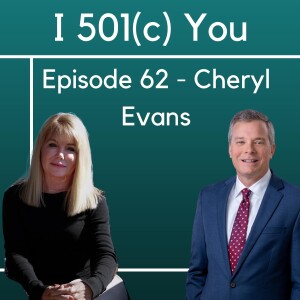
Tuesday Dec 05, 2023
Tuesday Dec 05, 2023
This week, we are speaking with Board President of Project Light of Manatee, Cheryl Evans. Together, we discuss how Cheryl got involved in Project Light, stepping into the board president role for the first time, and how she is growing in the position. Cheryl candidly shares with us her successes and struggles. Including overcoming obstacles to recruit board members, facilitating the board meetings, and recognizing staff and board members.
Project Light of Manatee
Timestamps:
00:00 Introducing Cheryl Evans
04:30 How did you become board president?
08:00 What have been your biggest challenges as board chair?
10:00 How Cheryl recruited board members
12:00 How do you structure your board meetings?
14:30 Interacting with the Executive Director
17:40 How do you recognize staff and board members?
21:17 Advice to an incoming board chair
23:50 Recapping with Read
Join us every week as we release a new podcast with information about how you can be the best board member and provide great service to your organization.
Listen to the podcast on any of the following platforms:
Apple Podcasts
Spotify Podcasts
Amazon
iHeartRadio
Visit us at: www.thecorleycompany.com/podcast
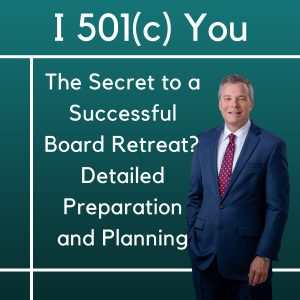
Tuesday Nov 28, 2023
Tuesday Nov 28, 2023
A board retreat is a wonderful opportunity for board members to get to know each other, to plan for the upcoming year, or discuss an important topic in depth. However, these can only be achieved with a properly planned retreat. Today, we discuss the strategies we use to conduct a productive nonprofit board retreat.
Timestamps:
00:00 - Our board retreat process
01:58 - Planning
03:20 - Preparation
05:30 - The run of show
06:50 - Include a meal
08:20 - Using a facilitator
09:00 - Follow up and action items
Join us every week as we release a new podcast with information about how you can be the best board member and provide great service to your organization.
Listen to the podcast on any of the following platforms:
Apple Podcasts
Spotify Podcasts
Amazon
iHeartRadio
Visit us at: www.thecorleycompany.com/podcast
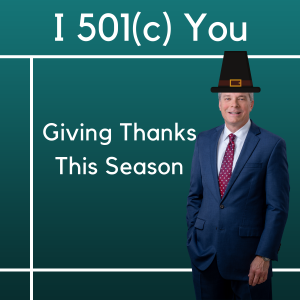
Tuesday Nov 21, 2023
Tuesday Nov 21, 2023
In the spirit of the season, today we are giving thanks. From us at The Corley Company, we thank the nonprofit organization’s making our community a better place, the leadership and staff that carry out the work, the donors that help make projects happen and the volunteers who give so much of their time.
Timestamps:
(00:00) Thank You Listeners
(01:20) 10% from Listen Notes
(01:40) Thank you guests
(02:00) Thank you for the organization
(02:50) Thank you Executive Directors
(03:10) Thank you staff
(03:30) Thank you donors
(03:40) Thank you board members and volunteers
Listen to the podcast on any of the following platforms:
Apple Podcasts
Spotify Podcasts
Amazon
iHeartRadio
Visit us at: www.thecorleycompany.com/podcast
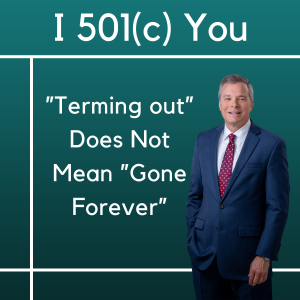
Tuesday Nov 14, 2023
Tuesday Nov 14, 2023
Imagine giving 3-6 years of your volunteer time to an organization, only to roll off the board and never hear from the organization again. This is a very realistic scenario for many board members. In this week’s episode, we are discussing what happens when you roll off a nonprofit board and how organizations can keep past board members engaged.
Timestamps:
00:00 - Board Tenure and when you leave the board
01:30 - How to engage past board members
Join us every week as we release a new podcast with information about how you can be the best board member and provide great service to your organization.
Listen to the podcast on any of the following platforms:
Apple Podcasts
Spotify Podcasts
Amazon
iHeartRadio
Visit us at: www.thecorleycompany.com/podcast
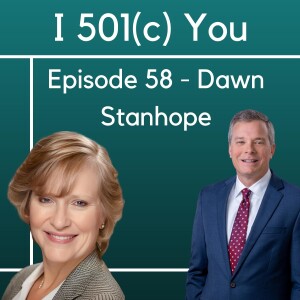
Tuesday Nov 07, 2023
Tuesday Nov 07, 2023
This week, we are joined by the CEO of Boys & Girls Clubs of Manatee County, Dawn Stanhope. When it comes to engaging your board, there aren't many people who do it like Dawn, and she actually has two boards. Listen in to hear Dawn’s strategies for keeping board members engaged, what she looks for when she is identifying new board members, and what a CEO needs from their board.
Timestamps:
(01:00) Introducing Dawn Stanhope
(03:00) What is your approach to working with your board?
(04:05) What is the CEOs role in engaging the board?
(05:40) Time management with the board
(08:50) Quarterly board social
(11:00) Identifying board members
(16:20) How have you evolved the board to reflect the composition of your clientele?
(20:55) What do you need from board members?
(22:45) Words of wisdom for new CEOs
(26:22) How do you manage everything with the board?
(29:00) Recapping with Read
Join us every week as we release a new podcast with information about how you can be the best board member and provide great service to your organization.
Listen to the podcast on any of the following platforms:
Apple Podcasts
Spotify Podcasts
Amazon
iHeartRadio
Visit us at: www.thecorleycompany.com/podcast
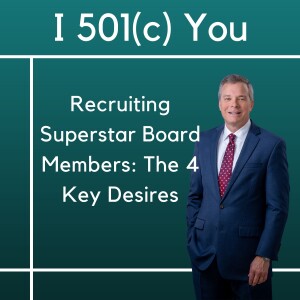
Tuesday Oct 31, 2023
Tuesday Oct 31, 2023
In this week’s episode we talk about what nonprofit board members want. People join nonprofit boards for a multitude of reasons, but we believe they can be narrowed down to 4. They want to contribute, make a difference, grow skills, and build relationships.
If your nonprofit board can provide these four things, we believe you will have an easier time recruiting and adding new board members.
Timestamps:
(00:00) Recruiting nonprofit board members
(01:52) #1 - They want to contribute/#2 - Make a difference towards the mission
(02:45) #3 - Grow skills and learn new things
(03:41) #4 - Build relationships
(04:30) Wrapping up
Listen to the podcast on any of the following platforms:
Apple Podcasts
Spotify Podcasts
Amazon
iHeartRadio
Visit us at: www.thecorleycompany.com/podcast
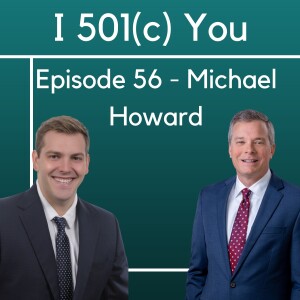
Tuesday Oct 24, 2023
Tuesday Oct 24, 2023
This week we are speaking with Atlas Insurance’s, Michael Howard. Michael has a wealth of knowledge in the nonprofit insurance space and generously shares with us. Michael explains the risks nonprofits need to be aware of that are not insurance related, the actual coverage a D&O insurance policy provides, when nonprofits and nonprofit board members can get in trouble, and most importantly, how to mitigate these risks. This is a must listen to episode for any nonprofit board member.
Learn more about or contact Michael
Timestamps:
(00:00) Introducing Michael Howard
(04:00) What risks do nonprofits need to be aware of?
(07:40) Trends in risk management nonprofits should be aware of
(11:40) What basic types of insurance should nonprofits have?
(13:40) Does your E&O and D&O actually cover everything?
(15:10) Where do nonprofits get in trouble?
(19:00) Other ways nonprofits can mitigate their risk
(20:55) What factors would you consider before joining a nonprofit board?
(25:17) Anything else?
(29:24) Recapping with Read
Join us every week as we release a new podcast with information about how you can be the best board member and provide great service to your organization.
Listen to the podcast on any of the following platforms:
Apple Podcasts
Spotify Podcasts
Amazon
iHeartRadio
Visit us at: www.thecorleycompany.com/podcast






